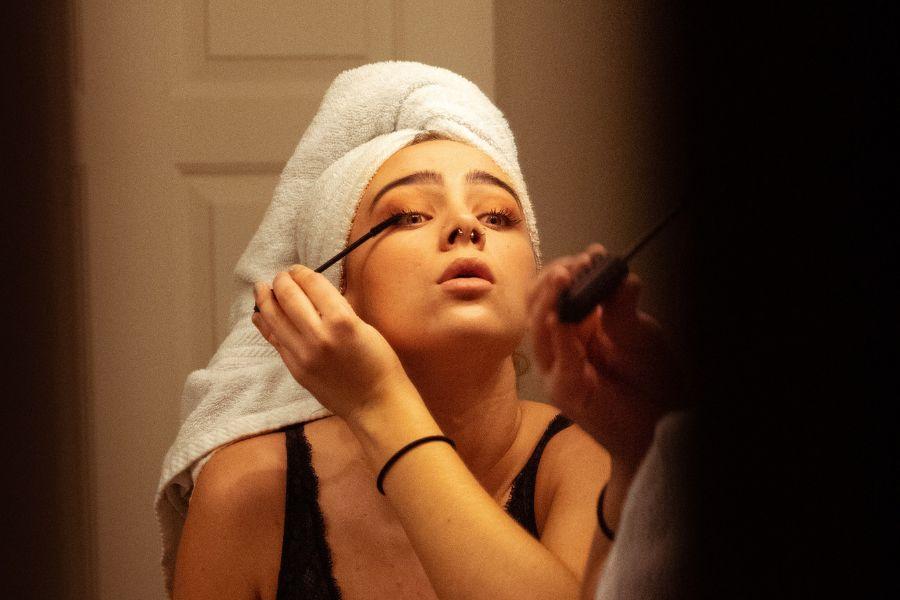“Mommy, why do you wear makeup?”
I don’t remember how old my first daughter was when she asked me that question, but I do remember feeling unprepared for it. Such a simple and reasonable question seems like it should have a simple and reasonable answer, but as I looked at her young face, I thought about how my answer could shape her entire view of women and beauty and her own self-image.
The full truth of why I wear makeup is complicated, as I’m sure it is for most women. I started wearing makeup mainly to cover up acne as a teen, but I remember being younger and feeling intrigued by eye makeup on magazine models. I started to mess around around with eye shadow and eye liner because it was fun to “paint” my face.
I like wearing makeup and always have. It truly can be fun, but I’d be fooling myself to believe that societal standards of beauty don’t also play a significant role in my choices now. I wear makeup because it makes me feel prettier and more “put together,” even when it’s just a quick five-minute routine. It makes my skin look better and brighter and it brings out my eyes. I think of it as enhancing my beauty rather than creating it.
There’s nothing wrong or unusual about that, but everything gets viewed through a different lens when you’re explaining something to a child—especially our own child.
I’ve never wanted to put society’s arbitrary and unattainable beauty standards on my daughters. I wanted them to reject anything that told them they weren’t good enough just as they are. I didn’t want them to feel like they needed to wear makeup to feel beautiful; I wanted them to choose how to define beauty for themselves. I wanted them to feel comfortable enough in their own skin to go without makeup, but also confident enough in their own choices to do whatever they wanted with their faces.
How could I explain why I wear makeup in a way that conveyed all of that to my young daughter without prematurely planting those pressures in her mind?
If this all sounds overwrought and overthought, it is. Welcome to womanhood, where every choice we make about our bodies is a mishmosh of historical patriarchy and corporate marketing, with some constant self-judgment and overanalysis thrown in for good measure.
My husband and I wanted to do what we could to ease those pressures for our girls, so we tried to talk about beauty in a way that was authentic and healthy as they were growing up. From the beginning, we talked a lot about beauty being about your inner state, not your outer presentation. We wanted our girls to internalize that message deeply before years of ads and billboards and magazines and Victoria’s Secret told them otherwise.
That was a solid parenting choice, but I couldn’t help but wonder if me putting on makeup felt like a mixed message. Was I being hypocritical, preaching that beauty on the inside is what matters, but trying to make myself more beautiful on the outside? One could take that argument to an extreme, not engaging in any grooming at all because outer beauty is just a facade, but that just seems silly and wrong. Ultimately, I told her the truth in all its complicated glory.
“Because I think it’s fun,” I said, realizing that would probably just make her want to wear it when she was still way too young.
“And because it makes me feel more ‘put together,’” I said, hoping that wouldn’t make her view women who don’t wear makeup as not put together.
“And because it highlights my natural beauty,” I said, knowing that the constant questions about what counts as beauty would soon begin to bombard her.
It wasn’t a perfect answer, but it was honest and sometimes honest is the best we can do.
My daughters are 22 and 18 now, and since that initial question we’ve had many more conversations about makeup, beauty, personal grooming and how society and individuals judge such things. Thankfully, I found it easier to talk about beauty as they grew older, as they started to understand how pressures from people we know and people we don’t can impact the choices we make.
Those pressures can go both ways, they found. One of my daughters felt pressure not to wear makeup and had to navigate her way through doing what was right for her. I’m happy to say that they have grown into young women who question beauty standards and challenge people’s judgments from all sides, ultimately landing on what makes them feel best in their own skin. That’s really all I had hoped for them.
Phew. Being a woman in this world can be complicated, but raising women in this world is entirely next-level.


































